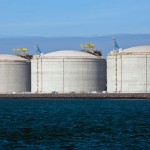Natural gas continued to fall on Thursday, a seventh consecutive day of declines, before the Energy Information Administration releases its weekly natural gas storage report at 14:30 GMT. The government statistics are expected to show a build above the five-year average and the same week a year ago.
On the New York Mercantile Exchange, natural gas for September delivery traded at $3.431 per million British thermal units at 11;33 GMT, down 0.44% on the day. Prices ranged between days high and low of $3.454 and $3.425 per mBtu respectively. The fuel fell 0.20% on Thursday, a sixth straight daily decline, and extended its weekly fall to over 3.8% after plunging 5.2% a week earlier.
Natural gas continued its fall as weather forecasts kept pointing at cooler than normal temperatures across most of the U.S. Northeast and Midwest over the next six to ten days. When above-normal temperatures are expected, natural gas surges as increased electricity demand to power air-conditioning calls for more supply of the fuel, which is used for a quarter of the U.S. electricity generation. Mild temperatures have the opposite effect.
Meanwhile, market players are looking ahead into EIAs weekly natural gas storage report due at 14:30 GMT on Thursday. According to a survey of analysts by Platts, the energy information arm of McGraw-Hill Cos., government statistics will most likely show natural gas inventories gained in range between 54 billion and 58 billion cubic feet in the week ending July 26. If confirmed, that will be well above the five-year average build of 47 billion cubic feet and the 28 billion storage increase the same week a year earlier.
Last week, the EIA said that U.S. natural gas stockpiles rose by 41 million cubic feet in the week ending July 19 and totaled 2 786 billion. The Natural Gas Storage Indicator was 12.5% lower than the same 7-day period last year, which equaled 3 185 billion cubic feet. The EIA reported that after a 25 billion cubic feet injection, stocks in the East Region were 120 billion below the five-year average. Meanwhile, stocks in the Producing Region were 45 billion cubic feet above the five-year average of 980 billion after an injection of 12 billion cubic feet.
Elsewhere on the market, both West Texas Intermediate and Brent oil rose more than 1% on the day. The American benchmark traded at $106.73 a barrel at 11:29 GMT, up 1.62% on the day. The September contract ranged between days high of $107.08, the highest since July 24, and low at $105.11 a barrel respectively.
Meanwhile on the ICE, Brent oil for September delivery stood at $109.07 a barrel at 11:31 GMT, marking a 1.27% daily gain. Futures ranged between days high at $109.45, the highest since April 2, and low of $107.53 a barrel.





